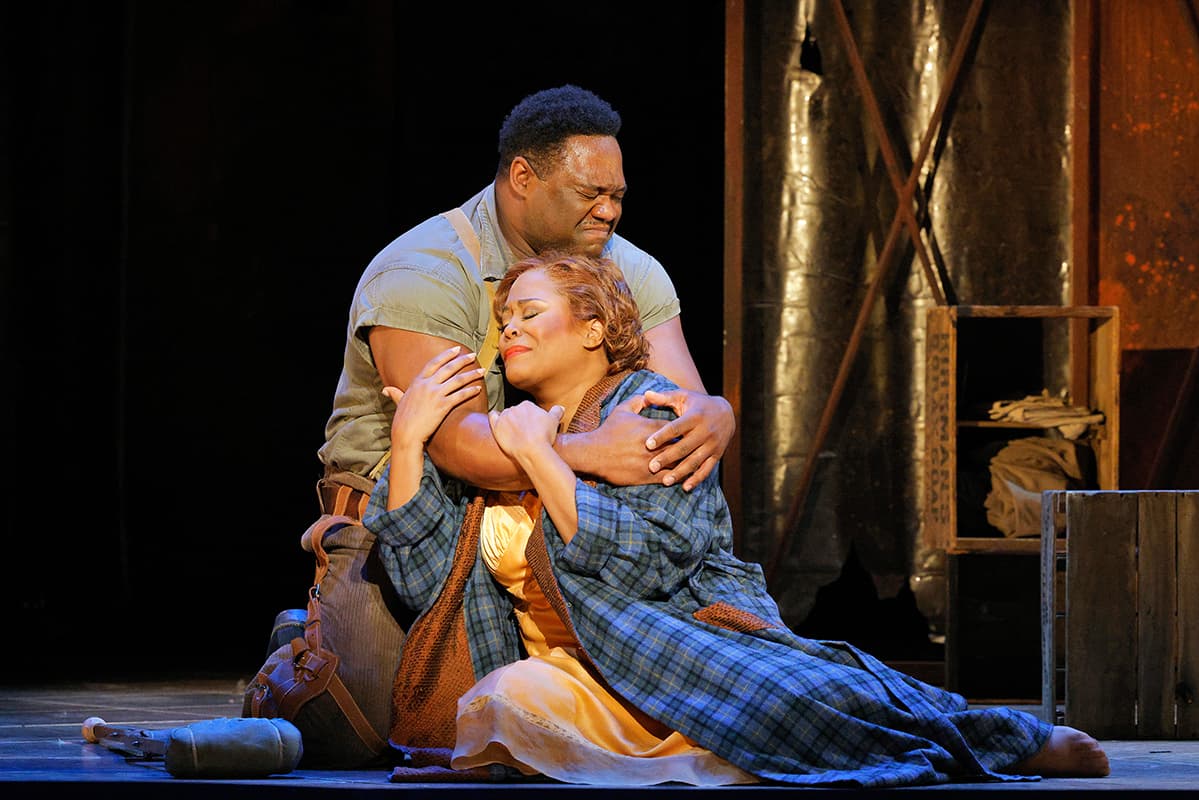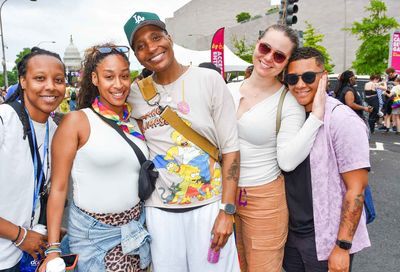‘Amm(i)gone Finds Love in Translation (Review)
A queer writer-performer seeks common ground with his traditional Pakistani mom in Adil Mansoor's engaging "Amm(i)gone."

Tasked with translating Sophocles’ tragedy Antigone into Urdu, Adil Mansoor decided to approach the assignment as an opportunity to forge a deeper connection with his mother, a hijabi Muslim and scholar, born and raised in Karachi, Pakistan.
The queer writer and performer, himself born in Karachi and raised in Chicago, explores their mother-son journey in his poignant solo play Amm(i)gone, in for a four-week run at Woolly Mammoth.
Mansoor, who developed the work at Pittsburgh’s Kelly Strayhorn Theater, and co-directs with D.C. native Lyam B. Gabel, defines the play partly as an apology from mother to son, presented primarily in first-person monologue.
Using an overhead projector set into a podium, and a laptop on the writing desk at centerstage, Mansoor cues up photos, text, and transcripts on a wall-sized screen that’s framed in latticework carved in the shape of Pakistan. The intricate woodwork of Xotchil Musser’s set design suggests the Islamic architecture of mosques and ancient libraries, with the modern touch of the writer’s Macbook signaling the intersection of tradition with modern technology.
The scenery echoes a mosque seen in a home movie that opens the play on the big screen. Dated 1992, the video shows Mansoor as a boy reciting from the Quran during a religious rite of passage known as ameen. Offering insight into Pakistani Muslim culture and terminology, Mansoor introduces himself and his family before shifting to Antigone, and the intriguing narrative of what happened after he asked his mother to act as his dramaturg for the new Urdu translation.
In their relationship, as well, traditional meets modern, but not without conflict, according to Mansoor’s reconstruction of his and his mom’s complicated history. First, he lets us in on the fact that “ammi” actually is the Urdu word for mom. Reading the title as “Ammi Gone,” then, captures some of the painful emotion underlying this story, one of reunion and understanding.
Mansoor tells us he largely kept his queerness hidden from his ammi, who, apparently, was happy to enable his secrecy by ignoring hints of that part of his life and identity.
His father, in his own way, too, advocated for his son to keep his sexuality to himself, declaring of men in their culture that “Everybody does that, we just don’t talk about it.”
The line gets a big laugh, over the course of a performance that engages through a detailed, compelling take on history and literature, easygoing good humor, and its consistently relatable story of a gay man coming out in stages to his loving mother. Though he’s “googleably gay,” as Mansoor points out, he and his mom never discuss queerness. Or they didn’t before embarking on this unique literary project.
But the process — and discussing Antigone’s plight as a woman defying religious and cultural law — helps open a new line of communication between them, which Mansoor amusingly depicts in his reconstructions of their phone conversations, via audio and onscreen text.
Though, despite the gift of being able to hear her voice, and learn so much about her experience as an immigrant and single divorced mom, Mansoor’s ammi remains distant as a character onstage.
At one point, he dons a scarf to portray her giving a performance in a play. As it turns out, even though she holds the theater accountable for her son becoming too different, she reveals during their collaboration that, much to Mansoor’s surprise, she used to do theater as a youngster. It becomes increasingly clear to him, and to us, that there’s so much more to his ammi than her devotion to Islam.
We learn that his parents’ marriage ruptured in 2001, just in time for 9/11, leaving his hijabi mother to raise a family on her own in the midst of the most anti-Muslim moment in his lifetime. Mansoor also introduces his younger sister and baby brother, but generally just plays himself onstage, and he hasn’t really built a characterization for himself that’s as compelling as the woman we never meet.
Unfailingly pleasant, he delivers the script in an ingratiating, sing-song upspeak that grows repetitive, like a rapper stuck in the same cadence, song after song.
Conversely, he and co-director Gabel, who happens to be trans, create the show’s most dynamic sequence in a beautifully written and performed monologue in which Mansoor comes out to his mom about his gay partner Luke, and their years-long relationship about which she never knew.
Not coincidentally, it’s a sequence that offers different shades of Mansoor’s character than just sweet, unaccepted gay son. Given more such shape and sharpness, Amm(i)gone would truly hit home.
Amm(i)gone (★★★☆☆) runs through May 12 at Woolly Mammoth Theatre, 641 D St. NW. Tickets are $34 to $82, with a limited number of pay-what-you-wish tickets available for each performance. Visit www.woollymammoth.net.
Support Metro Weekly’s Journalism
These are challenging times for news organizations. And yet it’s crucial we stay active and provide vital resources and information to both our local readers and the world. So won’t you please take a moment and consider supporting Metro Weekly with a membership? For as little as $5 a month, you can help ensure Metro Weekly magazine and MetroWeekly.com remain free, viable resources as we provide the best, most diverse, culturally-resonant LGBTQ coverage in both the D.C. region and around the world. Memberships come with exclusive perks and discounts, your own personal digital delivery of each week’s magazine (and an archive), access to our Member's Lounge when it launches this fall, and exclusive members-only items like Metro Weekly Membership Mugs and Tote Bags! Check out all our membership levels here and please join us today!





























You must be logged in to post a comment.